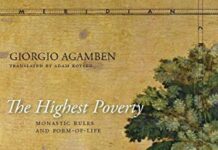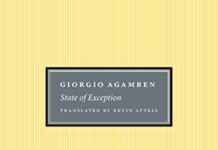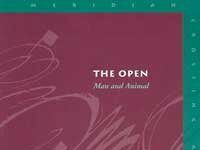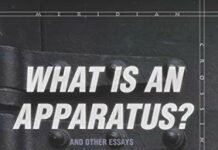
Ebook Info
- Published: 2024
- Number of pages: 64 pages
- Format: PDF
- File Size: 7.30 MB
- Authors: Giorgio Agamben
Description
Italian philosopher Giorgio Agamben is the rare writer whose ideas and works have a broad appeal across many fields, and his devoted fans are not just philosophers, but readers of political and legal theory, sociology, and literary criticism as well. In March 2009, Agamben was invited to speak in Paris’ Notre-Dame Cathedral in the presence of the Bishop of Paris and a number of other high-ranking church officials. His resulting speech, a stunningly lucid and provocative look at the history and state of the Church and its role in society, is presented here. The Church and the Kingdom is at once a pointed attack on the institutional structure of the Catholic Church and a theoretical excursus on the concepts of messianic time and economy. Presenting an exegesis of certain key passages in the New Testament, Agamben examines the philology and philosophy at the root of the Church and of its earthly reign. With its examinations of the foundational texts of the Church, which are also the foundational texts of our modern idea of economy, The Church and the Kingdom reveals significant connections and parallel ideologies which are imperative to understanding the current global situation. This edition of Agamben’s text is accompanied by photographs by artist Alice Attie. Made from folded and twisted reproductions of paintings culled from Christian iconography, these works of art evoke the restless challenge that well-characterizes Agamben’s four decades of philosophy and critique. This book will be welcomed by Agamben’s many readers across the disciplines.
User’s Reviews
Editorial Reviews: Review “Faithful to its surrounding, as if a similar place almost invokes this, Agamben’s text can be regarded as some sort of sermon. Contrary to most sermons, however, Agamben’s essay does not mainly have the faithful in mind.” ― Plurilogue About the Author Giorgio Agamben is one of Italy’s foremost contemporary thinkers. He recently brought to a close his widely influential archaeology of Western politics, the nine-volume Homo Sacer series. Leland de la Durantaye is the Gardner Cowles Associate Professor of English at Harvard University. He is the author of Style is Matter: The Moral Art of Vladimir Nabokov and Giorgio Agamben: A Critical Introduction.
Reviews from Amazon users which were colected at the time this book was published on the website:
⭐As always with Agamben’s prose, one can find a multitude of messages. On future readings, I expect I shall benefit even more from his counsel. On first reading, what leapt out at me was “…the Church can be a living institution only on the condition that it maintains an immediate relation to its end.” I interpret that to mean, heal the sick, care for the poor, visit those in prison, and pray for the love of all.This is a strange book. It almost has more images than words; I exaggerate. Anyone who knows Agamben’s work also knows he is seldom at a loss for words, yet this address (along with an interpretation from the translator and from the artist) can be read in a single sitting. On a surface level, Agamben’s words suit the occasion on which they were presented, addressed to the hierarchy of the Roman Catholic Church. At the level of the Church, as Christendom, he declares the crises we, in the West, share today. The issue remains whether anyone listens.Like a careful sculptor, he chisels an image from the marble of Western civilization to give us, at a glance, a shape of who we are and where we stand. The material gives way to the subject but not without lending its weightiness. Our tradition is never more compelling than when portrayed so completely.PS Agamben’s message resembles Heidegger’s words in conclusion of the brief section on “The Last God” in his CONTRIBUTIONS.
⭐Heidegger writes,”How few know that the god awaits the grounding of the truth of beyng and thus awaits the leap of the human being into Da-sein! It seems instead that the human being would, and would have to, await the god. Perhaps this is the most insidious form of the most profound godlessness. . . .The granting of this privilege happens only as history: in the transformation of beings into the essentiality of their determination and into their liberation. . . .”
⭐The Church and the Kingdom is an interesting read on many levels. Above all, it has the power of encapsulating the whole of Agamben’s project. In it, we learn that what is at stake in his work on Homo Sacer, and his repeated critique of law, is that the Law or State gains its power from secularizing Church power. But this Church who lends its power to the secular state is not the Church of the first century. So, what was the Church then that we might return to it? This is what Agamben seeks to answer in this short book, but its long answer can be found in his “theological works,” The Time that Remains, The Kingdom and the Glory, and The Highest Poverty. So, in this very small book, which was at first a talk, we get something like a distillation of Agamben’s entire thought.The one hesitancy I have with this book is its size. It is a very short book. The text itself is the neighborhood of twenty pages. The rest are pictures that are meant to somehow reflect the meaning of the text. Thanks to the pictures, the book makes it to about forty-ish pages in length. If that is not an issue for you, then the book comes highly recommended. If you are one who is reluctant to pay good money for something this small, then I’d suggest finding it in your library (but still highly recommend reading it).
⭐Giorgio Agamben’s “The Church and the Kingdom” is a beautifully written polemic for the (Catholic) Church, based on his Notre-Dame Paris homily of 2009. Leland de la Durantaye, the translator, equates Agamben’s work with Luther’s, “He charges the Catholic Church with having forgotten its calling… not by nailing theses to its doors – nor for that matter via newspaper op-eds… Facebook posts or Tweets. Instead, Agamben presents his observations calmly and courteously to the church, in the church. Notwithstanding this calm courtesy, then charge that he levels could hardly be graver.”Agamben looks at “ho chronos tE Paroikias” (1 Peter 1.17) as a paradigm for the church, with Paroikein meaning “to sojourn as a foreigner”. He contrasts this with “katoikein” to live as a citizen “and thus function like any other worldly institution.” Agamben censures the church for forgetting the Messiah and his Parousia. This results in an imbalance within the secular world:”The crises – the states of permanent exception and emergency – that the governments of the world continually proclaim are in reality a secularised parody of the Church’s incessant deferral of the Last Judgement.” Does he blame the church for deferring the Parousia? He continues with an accusation of legislationism which seems unjustified in such a short work, which will require deeper reading of his other works to evaluate: “with the eclipse of the messianic experience of the culmination of the law and of time comes an unprecedented hypertrophy of law – one that, under the guise of legislating everything, betrays its legitimacy through legalistic excess.” While this may cheer those who like to blame the current financial crisis on imbalanced regulation, Agamben goes further: “Nowhere on earth today is a legitimate power to be found.” Perhaps it takes a citizen of Bernasconi’s country to observe “even the powerful are convinced of their own illegitimacy.”This book is not for the weak-hearted, as a few words from the conclusion show: “The complete juridification and commodification of human relations… are signs not only of crises of law and state but… above all, of crises of the Church.” Acccording to Christian theology there is only one legal institution which knows neither interruption nor end: hell.” Yet I am intrigued as to how Agamben justifies this point. I was disappointed that the blurb somewhat oversold the latter “theoretical excursus on the concepts of messianic time and economy”, but remain impressed by his challenging vision and look forward to more of his work.
Keywords
Free Download The Church and the Kingdom in PDF format
The Church and the Kingdom PDF Free Download
Download The Church and the Kingdom 2024 PDF Free
The Church and the Kingdom 2024 PDF Free Download
Download The Church and the Kingdom PDF
Free Download Ebook The Church and the Kingdom




